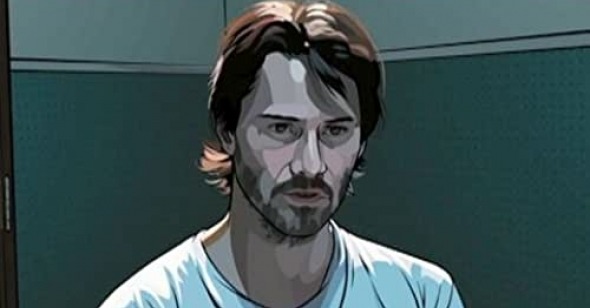Wasted Life
By Jeannette Catsoulis
A Scanner Darkly
Dir. Richard Linkaleter, U.S., Warner Independent
Dear Richard Linklater,
You don’t know me, but I am one of your most bipolar fans. I adored Slacker, but found Dazed and Confused repetitive and mystifying (my own high-school experience had more in common with Lindsay Anderson’s If...). Nevertheless, Before Sunrise and Before Sunset charmed me completely, even if Tape left me colder than a White House screening of An Inconvenient Truth. And I have yet to make it to the end of Waking Life, a film more effective than two Ambien with a brandy chaser.
It has become clear to me you’re not a big fan of drama. Rather, you’re drawn to stories as thin as gruel, not really stories at all so much as extended riffs on a faux-Cartesian attitude (“I talk, therefore I am”). It’s no surprise, then, that you would be attracted to A Scanner Darkly: most of your movies already play like the unspooling of surveillance tape. This time, however, the ante is upped significantly, as we’re watching a character who unknowingly witnesses his own decline. This Nietzschean nightmare offers a wealth of creative possibilities—Bertrand Tavernier’s Death Watch might give you some ideas—but you’re content to do little except play the voyeur. At least you have the grace to acknowledge the consequences: when Fred the Narc is watching tapes of himself as Bob the Druggie, another cop remarks, “You can go live, but that tends to be excruciatingly boring.” Unlike Fred, who at least has the option of fast-forwarding, the rest of us must endure every agonizing second.
The tedium of addiction, and of observing the addicted, may be accurately represented, but it’s hardly riveting cinema—the rare moments of insight are smothered by the freeform, meaningless yakking of brain-fried Bob and his substance-saturated buddies. (Perhaps you were hoping Downey and Harrelson’s real-life exploits would add authenticity, but, like any obvious product placement, their personal issues only distract from the narrative.) And while your ear for Gen-X aimlessness and disenchantment is arguably unparalleled, Scanner lacks the empathy and gentle irony that made Slacker so engaging. There’s a disconnect here between the characters and their representation—a focus on visual technique over narrative depth—that renders everything emotionally flat and ideologically lifeless. Not to mention unbearably confusing: just a few of the hours spent painting digital lines would have been far better employed connecting narrative dots.
Like Peter Jackson’s scavenging of Tolkien, Scanner may simply be a victim of source fidelity. By all accounts, you approached Philip K. Dick’s novel much as a fundamentalist Christian approaches the Bible, shackling yourself to the writer’s words and disregarding the opportunity to interpret his ideas. (Fellow Dick-divers Ridley Scott and Steven Spielberg could have given you some pointers.) But the path of literalness, once embarked upon, permits no detours; and as filmmaker Peter Greenaway has stingingly argued, if your goal is simply to “illustrate literature” then your artistic vision is necessarily an impoverished one. The Merchant-Ivory canon offers any number of genteel examples.
Then there’s your decision to animate. I realize that, had you chosen live action, the special-effects budget for the scramble suits alone—a cute but inessential gimmick—would have exceeded Nicole Kidman’s divorce settlement. And I totally understand the compulsion to animate Keanu Reeves. But Robert Downey Jr.? The man is already less stable than nitroglycerine. (Winona Ryder, on the other hand, should probably be rotoscoped for the remainder of her career.) Cartoon characters aren’t necessarily incapable of conveying the devastation of addiction; it’s just that human beings are better. And Scanner’s frustrating duality of tone—stoner comedy wedded to pharmacological tragedy—is one that real actors might have conquered, but their rotoscoped likenesses cannot. Each form sucks life from the other, and you’re left with neither the ecstasy of the high nor the agony of the dissolution, just a limp middle ground.
Even more problematic is the rotoscoping itself. When pictures are moving, most of us—not least those susceptible to grand mal seizures—generally prefer they remain on one plane. Your pulsing, wobbling figures might initially recall the trippy effects of excessive mushroom indulgence, but, like the mushrooms, the after-effects are nausea and double vision. The scramble suits are particularly stressful, and so disorienting any dialogue in their vicinity is completely eclipsed. If you’re making the point that only Substance D addicts would be cracked enough to process this movie, well props to you, clever clogs. I’ll send you my ophthalmologist bill.
I know this has been rough, Richard (can I call you Dick?), but even I admit that, buried among the shifting identities and throbbing perspectives, you pull off a few things quite brilliantly, like the circular lunacy of unregulated surveillance and the way drug use blocks the most basic intimacies. But not even a scramble suit can cloak the fact that A Scanner Darkly is finally a creative but infuriating film, lost in the labyrinth of addiction. To paraphrase Death Watch: “Everything matters, but nothing is of interest.”
